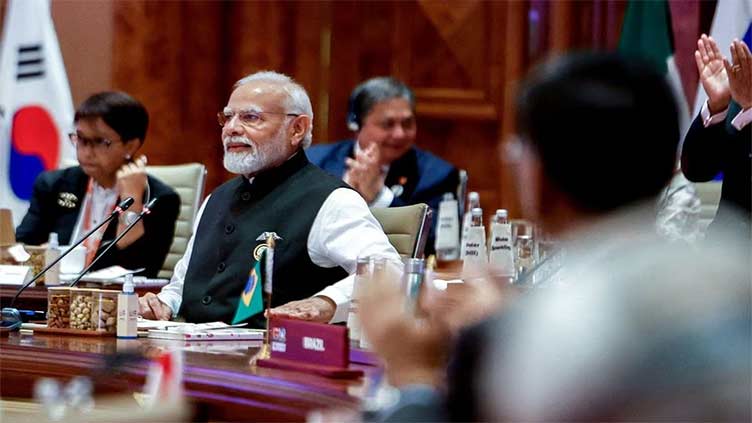Riding India's G20 wave, Modi's party sets up for elections

Pakistan
Analysts say Modi's political position is so strong there is little risk of the strategy backfiring
NEW DELHI (Reuters) – The weekend G20 summit was India's big moment on the world stage, giving the country an opportunity to work on global issues and providing Prime Minister Narendra Modi a chance to present his credentials as a global statesman.
Although some analysts said the meeting showed few concrete results, his Bharatiya Janata Party (BJP) is now cashing in on Modi's enhanced image ahead of a series of state elections and national elections due by May 2024.
In the run-up to the summit, Modi's face was plastered on G20 hoardings across the country. During the meeting last weekend, local television channels had wall-to-wall coverage of Modi with world leaders, including US President Joe Biden, and the praise that was showered on him for a successful meeting.
The BJP peppered its social media platforms with messages of praise from world leaders.
The summit declaration papered over key differences and had few breakthroughs in critical areas such as debt and climate change but for a popular leader with a long-dominant lead over his political rivals, these are diplomatic intricacies that matter little in domestic politics, analysts said.
India's successful mission last month to land a spacecraft on the moon is another factor that feeds into the country's feel-good image and gives Modi a fillip, they said.
The opposition Congress party has criticised Modi for turning G20 into an election campaign, charging him with promoting dialogue and peace on the international stage while his Hindu nationalist administration discriminates against religious minorities and quashes dissent, charges the government has denied.
But analysts say Modi's political position is so strong there is little risk of the strategy backfiring.
"The message which has gone out is that India has really emerged very strong in the world," said Sanjay Kumar, psephologist at New Delhi's Centre for the Study of Developing Societies.
"And it's only because of Modi. The narrative is the national pride of an average Indian has gone up," he said.
Modi enjoys high approval ratings and surveys suggest he will easily win the general election and a third term next year despite concerns about rising inflation, unemployment and an uneven economic recovery after the COVID-19 pandemic. Worries about violence in the northeastern state of Manipur have also affected Modi's image.
The BJP plans to highlight the "success of the summit" during fortnight-long celebrations of Modi’s birthday starting on Sunday, a party official said.
Modi's contribution to India's rising global stature will be a key theme of a special five-day parliament session beginning next week, the official said.
NATIONAL PRIDE
"It’s really a fact that India's image has transformed under Prime Minister Modi," BJP vice president Baijayant Jay Panda told Reuters.
Modi, who turns 73 on Sunday, swept to power in 2014 promising stability and change from what he called the long-ruling Congress party's corruption and poor governance.
He consolidated his win with welfare economics, boosting infrastructure and unabashed Hindu nationalism, winning a second term in 2019 with a bigger majority.
Modi often underlines national pride in his speeches, which resonates with a large section of the people that has been aggrieved about India's portrayal in Western media as a poor country, analysts said.
"Every small thing counts when a narrative of national pride is being built," said Yashwant Deshmukh, a psephologist with the C-Voter agency.
According to C-Voter's biannual "Mood of the Nation" survey in India Today magazine last month, 47% said India's G20 presidency will enhance the country's global stature and 73% said it will be a poll plank in 2024.
The opposition Congress party was not so impressed, with its chief spokesperson Jairam Ramesh saying Modi's statements of tolerance on the global stage are "sheer hypocrisy".
"At home...he remains silent on hate speech, lynchings, targeted killings, and attacks on holy places. His party, and the larger ecosystem he belongs to, has unleashed systematic polarisation campaigns...and has torn apart the social fabric of the nation," Ramesh posted on X, formerly Twitter.
The government has denied these charges.
Former Congress prime minister Manmohan Singh, who Modi replaced, said: "While India's standing in the world should rightfully be an issue in domestic politics, it is equally important to exercise restraint in using diplomacy and foreign policy for party or personal politics."


